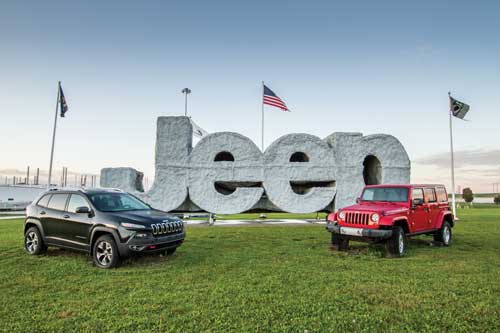By Danielle Stanton & Tom Konecny
Toledo Free Press News Editor, Toledo Free Press Associate Editor
dstanton@tfpmay.toledowebdesigns.com, tkonecny@tfpmay.toledowebdesigns.com
It’s normal to take pride in things unique to an area, and Toledo has plenty to go around.
A baseball team with a quirky nickname, a trend that’s been copied ubiquitously. A world-renowned art museum surrounded by a community craving and displaying more. A zoo voted best in the nation. The most well-known Hungarian restaurant this side of South Korea.

Jeeps have been built in Toledo for more than 70 Years. Now Wrangler production may leave the city. Toledo Free Press photo by Christie Materni / Cover illustration by James A. Molnar
Take away any of those, and a part of us dies. But try to take Jeep — a fixture that’s supported Toledo’s economy, offered livelihoods, enriched local heritage and advanced civic pride for generations — and you have the makings of a full-scale public rebellion.
At least that’s what seemed to be brewing after Fiat Chrysler CEO Sergio Marchionne told Detroit’s Automotive News that “Toledo is the wrong place” to build a potentially reconfigured aluminum body Jeep Wrangler.
Marchionne’s Oct. 2 remarks stood in stark contrast to those made in January at Detroit’s North American International Auto Show, when he was also quoted in Automotive News as pledging “never to produce a Wrangler outside of Toledo. So whatever Wranglers are going to be made are going to be made there as long as I’m the CEO. They’ll not be built anywhere else.”
Local reaction
It was Larry Vellequette of Automotive News who delivered the quotes that stunned Northwest Ohio. Vellequette knows Toledo well, having worked for The Blade for 25 years.
“I was kind of surprised,” he said of hearing Marchionne’s comments.
Vellequette also remembers Marchionne’s promises. First, Marchionne said Chrysler would not build another plant in North America, despite the fact they can hardly meet growing demand for the popular Wrangler.
Then, Marchionne made his now-infamous Toledo pledge.
“The question that I asked him, ‘Given the number of Wranglers you’re selling, which of those promises is going to be broken first?,’ elicited the response,” Vellequette said.
If Vellequette was surprised, others were shocked, including Lucas County Commissioner Pete Gerken, a former Jeep employee.
“Everything’s up in the air now, but it unleashed quite a can of worms,” he said. “We need to figure out our next steps, but we can only do that by talking to them. The reason we’re shocked is because we’ve had commitments from him that ‘We’ll never take the Wrangler out of Toledo.’ He said that to the workforce [and] governmental leaders and we took him at his word. It’s been a positive relationship.
“The Wrangler is Toledo, and Toledo is Jeep.”
Gerken insists if there’s new technology needed to build Wrangler, Toledo can provide it.
“If something’s changed, we can understand that,” Gerken said. “But for us to help them give the best quality product in a unique market, we need to be a part of the decision process.”
Gerken doesn’t believe Marchionne’s comments represent a “power play,” but insists that Toledo should be a part of the assembly process and any changes that need to be made.
“Let’s maintain the integrity of the brand,” Gerken said.
Toledo Mayor D. Michael Collins maintains the same position he has taken all along.
“The city is working with its partners to better understand these challenges and assist in any way it can,” Collins said.
Jeep history runs deep
If the Glass City is Toledo’s primary epithet, then Jeep City may very well be its second.
Toledo has been the headquarters of Jeep since the brand’s inception, a source of pride in more ways than one, not the least of which is pure American patriotism.
It was in June 1940, while anticipating that America would become involved in the escalating war, that the U.S. military informed automakers it was looking for a light reconnaissance vehicle to replace the Army’s motorcycle.
After the military entertained different designs and prototypes, Toledo automaker Willys-Overland obtained the first major manufacturing deal in 1941 and began building its legendary vehicle. The first civilian models were produced in 1945, making it the oldest off-road vehicle in history — no doubt a forerunner to today’s SUV. Jeeps were used by every service of the U.S. military, ideal because of their light weight, low profile and load capacity.
In 1950, Willys-Overland trademarked the Jeep name and since then the brand has passed to auto companies Kaiser, American Motors Corporation and now, Chrysler.
“Jeep really is Toledo,” said Pat Foster, automobile historian and author. “[But] one thing I like to point out to people is that they have made Wranglers elsewhere.”
Many forget that the Wrangler name officially dates back to 1986, when it was reborn as a revision of the classic Jeep CJ-7. It was produced at that time in Brampton, Ontario; it wasn’t until that plant closed in 1992 that Toledo took over Wrangler production.
In the mid-1990s, Chrysler explored the idea of replacing the old Jeep Parkway plant with another outside Toledo. Civic leaders and citizens banded together to keep the brand here, and in 1997 Chrysler revealed plans for a new $1.2 billion facility in North Toledo.
In 2011, Chrysler announced a $500 million addition to the plant, adding 260,000 square feet to the existing body shop and upgrading other areas of the assembly plant.
Chrysler continues with its two production facilities in North Toledo and a machining plant in Perrysburg. The North Toledo plant employs about 1,700 workers.
Economic impact
What if Wrangler production were to leave Toledo? Does that mean jobs would be lost? It has been reported that Marchionne said no jobs would be cut in Toledo if Wrangler were to move.
Economics professor David Black at the University of Toledo believes Chrysler is speaking of a “net job loss” for Chrysler. Meaning Chrysler could move those Toledo jobs to a different plant, still giving them a zero in job loss.
It’s purely speculation, Black said, but the effect of such a move by Chrysler would be “devastating” for Toledo.
“Toledo might lose 1,000 workers but Tennessee might gain 1,000 workers,” he said. “We’ve already had over the last six years a population loss because of some of the jobs leaving the area. This would accelerate that and lead to an exodus of the population. Because if there’s no jobs, people leave.”
Black said Toledo has lost about 1,000 jobs over the past several years. With a corresponding drop in population, the housing market would be hit and contribute to a downward spiral in the city. Black grew up in Buffalo, New York, he said, and when it lost the steel industry that was devastating to the area because people left, housing prices depressed and the city was left to rust.
“It happened to Detroit and it’s happening to Toledo,” he said.
“Toledo doesn’t want to lose Chrysler, but on the other side, Chrysler is somewhat invested in Toledo because there is a $2 billion plant. That’s a lot of capacity to walk away from,” Black said. “[Marchionne] said just a couple months ago [the Wrangler] would be made in Toledo; two months later he said the opposite. What are we left to think, except it’s a bargaining tool.”
Black did say that if there were no net job loss in Toledo, then there would be no economic impact.
United Auto Workers (UAW) Local 12 president Bruce Baumhower was unable to be reached for comment.
The big meeting
After a face-to-face meeting in Auburn Hills, Michigan, with Marchionne on Oct. 9, Collins assured the citizens of Toledo that whether or not Wrangler production leaves Toledo, the city’s jobs are safe.
“I can’t tell you positively that Wrangler will stay here,” Collins told reporters at One Government Center during a news conference Oct. 9. “But I can tell you that the UAW members will be employed whatever the decisions are for Wrangler.”
Collins sent a letter to Marchionne and also participated in a conference call with Marchionne and Gov. John Kasich after Marchionne’s comments. The mayor described his encounter with Marchionne as “positive.” Meeting the executive for the first time, Collins said Marchionne was “congenial, light-hearted and serious-minded” when it came time to discuss the issues.
Toledo officials who joined Collins at the meeting included Bob Reinbolt, his chief of staff; Toledo senior attorney Eileen Granata; and Matt Sapara, director of development. Other Ohio officials included Beth Hansen, chief of staff to Kasich, and John Minor, JobsOhio’s president and chief investment officer.
Collins’ aim was to keep the iconic Wrangler in Toledo. But he said he did not visit the Chrysler executive in order to tell him how to run his business.
“Government doesn’t dictate to private industry,” he told reporters.
“I took the man at his word,” he said. “I believe there was no insincerity. We have to work together.”
Collins said whatever Marchionne’s plans are for the Wrangler, he felt confident that Marchionne was “sincere” and that jobs at the Jeep plant would remain safe.
“It’s clear that the new federal fuel efficiency standards are putting enormous pressure on automakers and the company restated its position that it believes the new standards make it very challenging for it to continue building the Wrangler in Toledo,” Kasich spokesman Rob Nichols said in a written statement after the meeting. “Chrysler agreed with what the governor and mayor have said, that the Toledo workforce is one of the company’s best and has been determinative to its success, and there was no discussion of any reductions to that workforce.
“It was a candid and constructive meeting that gave the state and city a clearer understanding of the tough decisions facing the company. We restated what the company already knows to be true, that the governor and mayor are poised to continue being good partners in the company’s success in Toledo, and additional follow-up discussions will happen again soon.”
Rep. Bob Latta was among area politicians to come out with a statement. In it, he says he sent a letter to Marchionne requesting a meeting and expressed concern over the economic impact were Wrangler to leave Toledo.
“The Toledo Jeep Wrangler production facility is not only an important economic driver in Northwest Ohio, but it is also an important part of the local community,” Latta said in his written statement. “Toledo’s highly skilled workers have institutional wisdom that is a direct result of their experience and commitment to producing Jeep Wranglers, something that is not easily replicated. I urge Mr. Marchionne to keep this longstanding partnership and history of success between the company and the Toledo-based community in mind. I look forward to discussing further this important matter with him.”
Right now, the only thing that’s clear is that nothing has been decided. We know the economic impact were jobs to leave; we know our leaders want the Wrangler to stay. We also know that Marchionne plans to retire in 2018.



